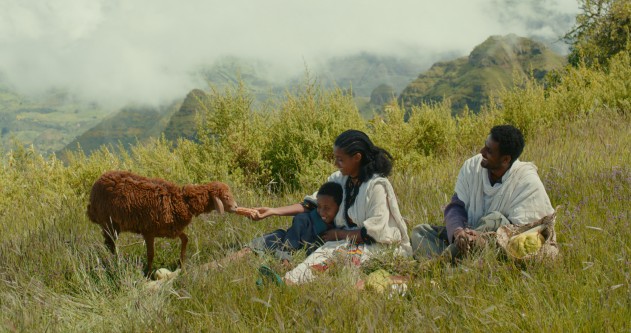CANNES FESTIVAL | Interview with Yared Zeleke, the director of LAMB
CANNES, France – Zeroing in on the influences that push someone towards a career as filmmaker isn’t an easy task. But where Ethiopian director Yared Zeleke is concerned two events can be said to have been defining ones: a photo he saw in the French city of Cannes fourteen years ago and his emigrating to the U.S. with his father at age ten, a very difficult moment. “My grandmother raised me,” Zeleke told me during an interview held this afternoon, “I grew up with her stories. Up until age ten, I had a childhood that was magical, it was full of colors and love and festivities.”
In his film LAMB (shot in thirty-six days at a total budget cost $ 1.5M USD) which is competing for the Camera D’Or prize as a first film, young Ephraïm (Rediat Amare) also experiences the pain of separation, after his father leaves him with relatives in order to go find work in a different region of the country. The boy, barely ten, keeps a barren pet goat that follows him everywhere like a Saint-Bernard. The woolly cutesy becomes a topic of conversation among Ephraïm’s relatives. His uncle wants to sacrifice the animal for the upcoming religious feast. The boy, for his part, is obviously ready to do anything to save his pet goat from being killed.
With LAMB Zeleke has told a provocative yet universal story that confronts traditionality with modernity. Through the boy’s various negotiations with the adults around him we’re shown what Ethiopian society is like (unsurprisingly, it is conservative) but also what it is capable of becoming (a forward-thinking society in step with the times). Tsion, a young rural woman (played by Kidist Siyum) and the boy’s cousin reads newspapers all day and will not turn out like the village’s other women who tend to the home and their husbands, work at market or in the fields. D.P. José Deshaies (SAINT LAURENT) turns up an Ethiopia that’s postcard-perfect, with verdant hills and vivid landscapes that gnaw slowly at the jaundiced view we’ve held of this country for the last three decades. This is not the fly-covered pile of dust I think I used to see on TV as a kid. Ethiopia is like Tanzania, a little piece of heaven in the Horn of Africa. “The country didn’t have a good reputation at the time but it’s not all misery and horror, it’s a life of struggle, like anywhere else.”
Zeleke has pedigree: an NYU Tisch degree in Film. But he wasn’t destined to become a filmmaker. Reacting to a desire to work with Ethiopian farmers he studied agro-economics at the University of Norway, although this did not go well. “I became depressed in terms of what it is that I want to do with my life. There was this longing, this childhood that was cut off. This became the impetus for me to ask myself, what would I do with my life if Ethiopia didn’t consist mostly of farmers?”
The other event that likely shaped Zeleke’s desire to show a different Ethiopia to the world and ultimately pick up a film camera took place fourteen years ago on a tour of Europe that landed him in … Cannes. “I didn’t think I’d become a filmmaker, but I knew this place was famous for film.” He attended an exhibit on Ethiopia at the Musée de la Mer. “What I saw there really disturbed me, it was the same cliché, again: a photograph of a young girl leaning on a wall (that of a Rock-Hewn Christian church, Ethiopian monuments designated world heritage sites by UNESCO) and begging from passersby. I told myself, I will come back one day to this city to show them the real Ethiopia through my eyes.”
Zeleke eventually moved to New York City where he studied under Todd Solondz, among others eminent Tisch faculty. He wound up living in New York City for a decade before moving back to Addis Abeba to work on LAMB. The Ethiopian filmmaker nowadays splits his time between New York City and Addis Abeba.
This film was selected as part of the UN CERTAIN REGARD series and is competing for a Camera D’Or prize (the winner will be announced on Sunday.)
(photo: an)
news via inbox
Nulla turp dis cursus. Integer liberos euismod pretium faucibua



